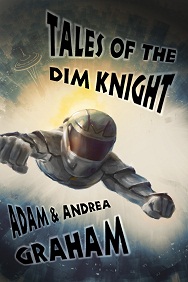Please Welcome...Adam Graham
This month our interview guest is Christian speculative fiction novelist Adam Graham. Adam Graham is the author of Tales of the Dim Knight along with his wife, Andrea. He is the host of several vintage radio podcasts and a contributor to Pajamas Media and Race42012. He is also President of his local ACFW Chapter. I recall meeting Adam and his wife. It was the first day of the Oregon Christian Writers Conference, several years ago. As is the case today, I had the reputation as the editor who liked weird fiction. By the end of any writers conference, all the speculative fiction authors would eventually been sent to me, a fact I enjoy to no end. It’s good to be king of a niche. So when I saw this large, bearded gentleman walking around the conference grounds while wearing a kilt, I said to myself, “He’s destined to come my way.” LOL. Sure enough, at the first meal, guess who was at my table? He and Andrea are a joy, and I’m thrilled that their first novel has been published. And now, the interview... WhereTheMapEnds: Catch us up with you. What have you been doing lately? Adam Graham: I had a very unusual car accident, but other than that, I’m working on a non-fiction, non-speculative book, All I Needed to Know, I Learned from Columbo: Life Lessons from Great Fictional Detectives. I’m also working on a speculative detective short story with a time travel element called, An Ounce of Prevention. Soon I plan to transform an unpublished novel into an audio drama script. WhereTheMapEnds: Hmm...unusual car accident. Care to elaborate? Adam Graham: I guess I could tell you. An elbow joint near the area of our car that controls the brakes broke. Typically when that happens, the car's engine will burn up. Not mine, though. My car's computer took over and decided what was needed was more power to that area of the car.
And so the car ran as if nothing were wrong until I was pulling into
my parking space at work. I hit the brake and it decided to fail. At the same
time the accelerator kicked into high gear and went over the bump and
into the dirt at the end of the space. It continued going until it was
stopped by a large concrete wall that left $3,000 worth of damage to
the car's body. While it was a horrible thing to happen, it couldn’t have happened in a better place. The dirt in front of the concrete barrier was so deep it actually helped slow the car down. So, I'd say that part of the parking lot is the best place for your car to do its best imitation of a devil-possessed vehicle. However, some may want to avoid that experience altogether. WhereTheMapEnds: Um, yes. How helpless you must’ve felt too. Praise God no one was hurt. Speaking of possessed vehicles, Adam, what is your favorite speculative novel of all time (Christian or secular) and why is that your favorite? Adam Graham: Without question, it’s The Oath by Frank Peretti. Peretti weaved an incredible tale laced with mystery and a subtle allegory that didn’t become apparent until the very end. It was fantastically atmospheric and incredibly well done. WhereTheMapEnds: What made you want to write Christian speculative fiction? Adam Graham: The great opportunities for large scale commercial success! WhereTheMapEnds: I said Christian speculative fiction, Adam, not humor. [grin] Adam Graham: Oh, sorry. Seriously, I write the ideas I get, and I do write stories that would not be considered speculative. However, many of my ideas fall within the range of speculative fiction. I was raised on Star Trek, Star Wars, The Twilight Zone, and Alfred Hitchcock Presents, as well as a host of 1990s superhero shows. So my imagination gravitates towards time travel, superpowers, and aliens. WhereTheMapEnds: How was your first idea for a Christian speculative novel received (by anyone: spouse, friends, parents, agent, publisher, readers, reviewers, etc.)? Adam Graham: My first idea for a Christian speculative novel didn’t get published and didn’t get submitted anywhere. It was set in a future where China had conquered America and an American resistance army was fighting back. I wrote it when I was 16, and it was so-so. My dad liked the premise, but, as an old Green Beret, he critiqued the military parts of it. Discouraged, I ended up not doing anything with it. As far as I know, it’s still in a drawer in Kalispell, Montana. WhereTheMapEnds: It’s still a good premise, and one that looks more realistic now even than then. You should resurrect the story, if not the ms. itself. What is your favorite speculative genre to read? To write? If they’re different, talk about that. Adam Graham: I prefer to read and write from the sci-fi side of the spectrum. Fantasy is harder for me to get into. I’d rather read a story that asks, “What might happen in the future?” than one about a past that never occurred, and couldn’t have occurred, either. If the story is connected in some way to reality, I'm much more comfortable. I have collaborated with my wife in her unpublished Argevane series. However, that’s a contemporary, matriarchal alternate universe where men have been discouraged from aggressive behavior, scientific exploration, and learning how to read. As opposed to our society where they’d just rather play violent video games. WhereTheMapEnds: Sorry, could you please keep your words to two syllables or…um…not as much as two syllables? How would you characterize the current state of Christian speculative fiction writing and/or publishing? Adam Graham: It’s still nascent. The networks that support it are small as are the publishing houses that produce it. Quality is all across the board, as are quality controls. WhereTheMapEnds: What have you seen that encourages you about Christian speculative fiction writing and/or publishing? Adam Graham: Some fantastic authors are out there. The rise of Print on Demand and eBooks removes some of the gatekeepers that separate authors from their readers. WhereTheMapEnds: That’s absolutely correct. For the most part, that’s a great thing. Now those previously marginalized books and authors can find their audience. The flipside of having the stops removed is that now anyone with an Internet connection can publish their novel. Talk about a lack of quality control. What have you seen that discourages you about Christian speculative fiction writing and/or publishing?
Adam Graham: The lack of support can be frustrating.
Writers of “normal” Christian fiction often don’t understand
speculative fiction. I submitted a draft of the first few pages of a
novel about an 18 inch-high superhero to a contest. A judge said he or
she didn’t believe in my character and couldn’t wrap his or her mind
around it. WhereTheMapEnds: For support from people who love to write and read Christian speculative fiction, be sure you’re a regular over at The Anomaly forums. What would you like to see changed regarding Christian speculative fiction writing and/or publishing? Adam Graham: I’d like to see more of our genre made available in other formats: audiobooks, dramatizations, and video games. Many of these books would be well suited to that. WhereTheMapEnds: What do you think Christian speculative fiction writing and/or publishing will look like in three years? Five years? Ten years? Adam Graham: I see a lot of independent imprints focusing on a few authors who function as cooperatives, and perhaps a few very big publishers. Hopefully, we’ll be fully leveraging new technology to do our business better. WhereTheMapEnds: What advice would you give to someone who aspires to write and publish Christian speculative fiction? Adam Graham: It’s important to be grounded in a biblical worldview, or your speculative worlds are going to be distorted. Be persistent, and be prepared to take steps that go outside the parameters of, “How to Get Your Book Traditionally Published 101.” WhereTheMapEnds: What’s the best book or seminar on fiction writing you know? Adam Graham: Many are good. Having listened to and read a lot of materials, I find one flaw with writing advice out there is that some things are given as universal rules that really are specific to one type of personality or one type of writer or book. My best advice is to obtain a lot of information, apply what works, discard what doesn’t. WhereTheMapEnds: What’s the best part about writing and publishing Christian speculative fiction? Adam Graham: We get to write what we want. We’re not guaranteed massive success, but a place in the marketplace that allows readers the chance to read our work.
WhereTheMapEnds: What’s a cool speculative story idea
you’ve had lately? WhereTheMapEnds: Your superhero idea sounds great. It’s very similar to John Otte’s Failstate, due out next year from Marcher Lord Press, much of which takes place on a superhero reality show. So, what’s the best speculative story (Christian or secular, book or otherwise) you’ve encountered lately? Adam Graham: I loved Fred Warren’s short story collection, Odd Little Miracles. Warren showed a lot of imagination there. Imagination is something we as writers have got to keep, because so many speculative stories have been done to death. I understood that when I watched Titan A.E. and realized that my big problem with it was that it was like a hundred other science fiction movies. WhereTheMapEnds: What else would you like to say to the readers of WhereTheMapEnds.com? Adam Graham: Thank you for the interview. It’s great to be featured on WhereTheMapEnds because I’ve found some good writing tips here. So I’ll close with the immortal words of Bill and Ted, “Listen to this dude, Rufus—I mean, Gerke—he knows what he's talking about.” That's All for This TimeAnother awesome interview! Thanks again to Adam Graham for stopping by. Be sure to visit him online. If you missed any of our previous interviews with other speculative authors, including Frank Peretti, Jerry Jenkins, Karen Hancock, Tosca Lee, and Ted Dekker, you can read them here. Come back next month for an interview with another heavy hitter in the world of Christian speculative fiction.
|


